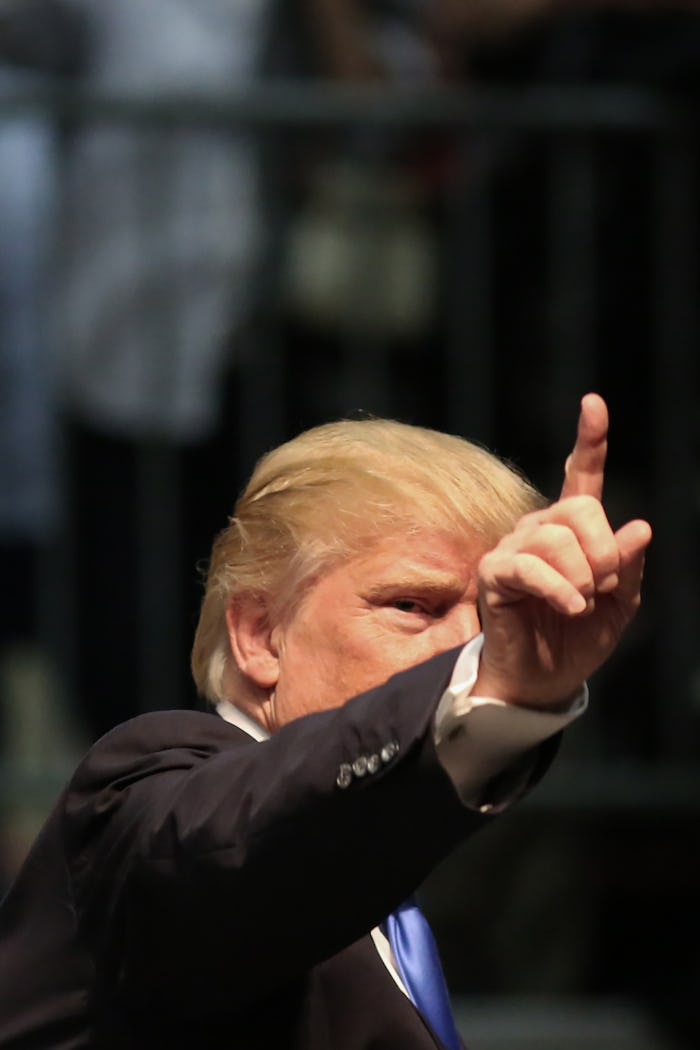News

Could Closet Trump Supporters Help Him Win? It's An Unlikely Scenario
For voters supporting Democratic candidate Hillary Clinton, there's a scary faction of people that they believe could sneak in and sway the vote on Nov. 8: secret Trump supporters. (You know the kind — they know exactly how their friends feel about Republican nominee Donald Trump's calls to build a wall or his comments about women, so they'd rather keep their agreement with his immigration policies on the down-low.) But are their numbers so huge that closet supporters could actually help Trump win?
There are good reasons why some might worry about a closet Trump vote. After all, say some, the polls surprised us during primaries, didn't they? They surprised the entire world when it came to Brexit. And with social desirability bias keeping some Trump supporters hushed — "Not even my wife knows," one supporter told The Guardian — couldn't there be a hidden group of Trumpists out there that polls simply aren't capturing?
That's a theory Trump has been touting in order to explain lower polling numbers than Clinton has. Recently, Trump called himself "Mr. Brexit," according to The Washington Post, and while in New Hampshire in October, he promised, "There’s going to be a lot of Brexit happening in about two weeks. A lot of Brexit."
When it comes down to it, though, a Brexit-style surprise seems unlikely for Trump and his supporters. This is due to a few reasons. First of all, as political analyst Harry Enten explained in a FiveThirtyEight post, Trump didn't really outperform polling averages for him in the primaries and caucuses. Analyzing 34 states that had both polling and primary results available, Enten found that Trump did worse than polls expected in 19 states and better than polls predicted in only 15 states. Analysis of Trump's live-interviewing poll results showed the same effect: Trump, on average, underperformed by 1 percentage point when compared to poll predictions. There may be closet Trump supporters out there, but so far, they haven't been affecting polling averages very much.
Another thing to keep in mind is that while yes, there are a few closet Trump supporters out there, the actual recorded difference we've seen in polling and votes usually comes from minorities — and minorities, in this election, are going overwhelmingly for Clinton. (A Reuters/Ipsos poll found Clinton leading Trump by 57 percentage points among African-American voters and by 15 percentage points among Hispanic voters; she enjoys a 62 percent favorability rating from Asian Americans, according to a national survey; and a NBC/SurveyMonkey poll found Clinton was winning over 72 percent of LGBTQ voters.)
Those minorities were what helped President Obama win the election in 2012: national polls showed Obama and his opponent, Mitt Romney, nearly tied — yet in the end, Obama won by about four points. So why were the polls off? According to The Washington Post, the 2012 election polls often didn't ask the right questions in the right languages or they surveyed mainly white voters — and that's a problem that's being repeated in 2016. Some minorities don't speak English and can't accurately answer poll questions, but will still be voting. Others are harder to reach by phone or online, but will still be voting.
So yes, closet Trump supporters do exist. But when you look at the numbers, there's little reason for Clinton supporters to fear a silent, Trumpian majority — and in fact, Trump should likely be worried about the unpolled minorities who will show up on Election Day, despite being skipped over by polls.